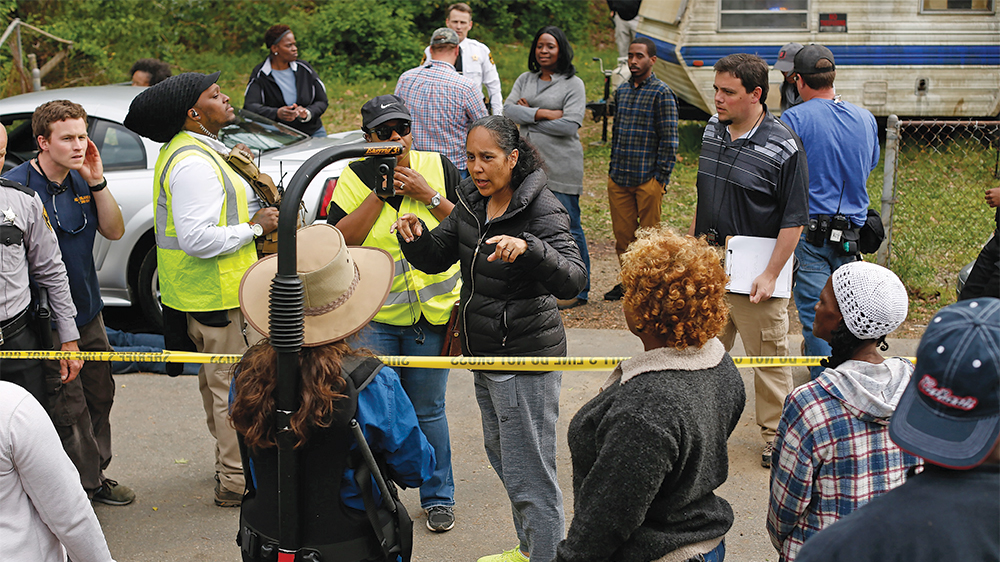Director Gina Prince-Bythewood: Representation Still Too Rare in Hollywood (Guest Column)
By Gina Prince-Bythewood
LOS ANGELES (Variety.com) – Rihanna brought the thunder at this year’s NAACP Image Awards, telling the room that other races who befriend black folks need to also stand for us in the fight against racial oppression.
“They wanna break bread with you, right? They like you? Well then, this is their problem too . . . Tell your friends to pull up.” So to all my friends in this industry, this is my call for you to pull up.
Representation matters. It matters to us on a deep, molecular level. When we watch ourselves on screen being heroic, or desired, or brilliant, or in love, we can see that for ourselves. And the world sees that in us. When a 6-year-old black girl can be zip-tied and put into the back of a police car over a simple tantrum at school, the world is not seeing our humanity.
I remember when I was 17, I sat in a theater and the trailer for “She’s Gotta Have It” came up. I was staggered by seeing black folks on screen. I didn’t know what the film was about, I just knew for the first time I did not feel invisible. At an audience preview for “Love and Basketball,” a 17-year-old black boy wrote that the film taught him how to love. I am continually humbled by the number of female athletes of all races who are inspired by the film. At a festival screening of “Beyond the Lights,” a 40-year-old black man spoke of the pride he felt watching the innate goodness of the black male character. A black woman in her twenties recently saw an early cut of my new action drama “The Old Guard,” starring Charlize Theron and KiKi Layne, and said she wished she had this movie, and the character Nile (played by Layne) when she was 12. Representation matters, but it is still too rare in an industry that prides itself on getting better. Representation is not decorating your film with supporting characters of color. It’s about giving filmmakers of color the space to tell the stories, from our lens and our truth.
I once worked on a film with a black female lead. Her character was dope and heroic. A white male writer with several films on his resume was hired to do a polish of the script. This writer chose to rewrite her strong, heroic moments with stage direction like, and I quote, “She cowers.” “On instinct, she backs away.” “She trembles.” Where she was strong, he made her weak. He diminished her character and her story arc.
Way too often, black audiences are giving the side-eye to black characters in movies. They are often the sidekick, the comic relief, in service of, or saved by, the white characters, and lack full, meaningful storylines. We wonder why this continues to be a pattern. Reading those script revisions, I had a front-row seat to the answer. But I was there to intervene. In a position of power. I recognized and felt the diminishment of her character and said, “hell no” (my language was a tad stronger). I restored her arc. I restored her strength and heroism. But the maddening truth is that we are not there enough. From 2007 – 2018 only 6% of films were directed by black directors. That means in the majority of films, we are seeing ourselves through someone else’s lens. A skewed perspective not generated from real-life interactions or experience, but rather from the intake of previous characters on screen who were depicted as less than, sidekicks, diminished. Recognize this when it happens and stop it. Make it your problem, too. Representation matters. Pull up.
And for us, we need to build up the ranks. When we get the opportunities, leave it all on the floor. No fail policy, make a great film. Take those talented people of color around you on the ride, too. My incredibly dope editor, Terilyn A. Shropshire, has edited my films and my pilots. We recently made the jump into the big-budget arena together with “The Old Guard.” She killed it. And now a black female editor is in the room. And when we get through the door, reach back and pull others through with you. Being the only one in the room is not a reason to celebrate. It’s a reason to elevate. Revel in filling it with more. Don’t just admire a new, talented filmmaker’s work. Be active in fostering their career. I recently saw a new film “Miss Juneteenth” that premiered at Sundance. Written and directed by an exciting young filmmaker named Channing Godfrey Peoples. It is a dope film. The authenticity of the world and its characters is so refreshing and poignant. You can feel that the filmmaker lived her truth. The incredible specificity did not make the film inaccessible. It made it more engaging. I cried twice. It is looking for distribution. Pull up.
Representation allows for authenticity, not imitation. It allows for differing perspectives. It allows for diversity in storytelling. It allows for inspiration and aspiration. It can literally change the world. Pull up.
Gina Prince-Bythewood is a screenwriter and director. Her credits include “Shots Fired,” “Love & Basketball” and the upcoming “The Old Guard.”

